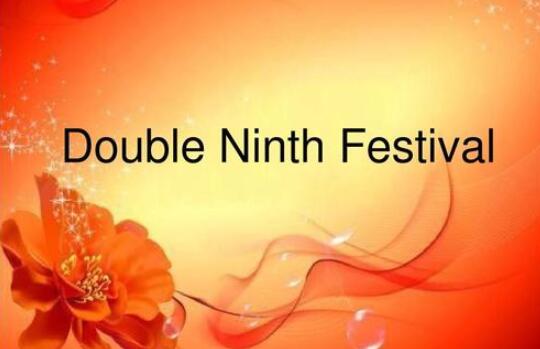重陽節(jié)英語是:Double Ninth Festival,重陽節(jié),為每年的農(nóng)歷九月初九日,是中國傳統(tǒng)節(jié)日,又稱登高節(jié),民間還有重九節(jié)、茱萸節(jié)、菊花節(jié)等說法。
又稱“重九節(jié)”“曬秋節(jié)”“踏秋節(jié)”,形成于戰(zhàn)國時期,到了唐代被正式定為民間節(jié)日,此后歷朝歷代沿襲至今,成為中國傳統(tǒng)節(jié)日。2006年,重陽節(jié)被國務(wù)院列入首批國家級非物質(zhì)文化遺產(chǎn)名錄。

1、重陽節(jié)用英語怎么說?
重陽節(jié)英語是:Double Ninth Festival
英 [?d?bl na?nθ ?fest?vl] 美 [?d?bl na?nθ ?fest?vl]
重陽節(jié);重九;重陽
2、重陽節(jié)英語例句
1.It is also the traditional custom to wear cornel and admire chrysanthemums.
插茱萸和賞菊也是重陽節(jié)的傳統(tǒng)習(xí)俗。
2.Huizhou folk have the custom of mountaineering and flying kites in Double Ninth Festival.
惠州民間重陽節(jié)有登高和放風(fēng)箏的習(xí)俗。
3.My favourite festival is the Double Ninth Festival, because my birthday is on this day.
我最喜歡的節(jié)日是重陽節(jié),因?yàn)檫@一天是我的生日。
4.The traditional Double Ninth festival is on the ninth day of the ninth lunar month.
本文介紹了中國的傳統(tǒng)節(jié)日重陽節(jié)的來歷和慶祝方式。
5.China's traditional lunar chung yeung festival and other festival, also not on vacation.
我國傳統(tǒng)的農(nóng)歷重陽節(jié)等其他節(jié)日,也不放假。
6.In ancient time, people used to climb mountains on this day.
在古代,重陽節(jié)人們有登高的習(xí)俗。
7.Well, there are Dragon Boat Festival, Mid-autumn Festival, Chung Yeung Festival and so on.
嗯,還有端午節(jié)、中秋節(jié)、重陽節(jié)等等。
8.Hence, recently, the Double Ninth Day has become an occasion to pay respect to the old.
因此到了近代,重陽節(jié)這一傳統(tǒng)節(jié)日又有了新的節(jié)日內(nèi)涵&敬老、愛老。
9.Tomorrow is Double Ninth Festival, Wish all the old people a happy holiday!
明天是九九重陽節(jié),祝愿所有的老人節(jié)日快樂!
10.Last week's holidays has just finished, today was at work, tomorrow is off again.
剛過完十一假期,今天上班,明天是重陽節(jié)又放假。
11.Among the candidates are the Eve of the Chinese New Year, Moon Festival, Dragon Boat Festival, Double Nine Festival, Lantern Festival and Qingming Festival all bearing the profound Chinese culture.
在候選名單中有除夕、中秋節(jié)、端午節(jié)、重陽節(jié)、元宵節(jié)和清明節(jié),它們都有著豐富的中國文化內(nèi)涵。
12.When I was young, it was also an occasion to remember the ancestors, the sacrifices they made and the hardships they underwent.
當(dāng)我小的時候,重陽節(jié)也是紀(jì)念先祖的時刻,紀(jì)念他們做出的犧牲和經(jīng)歷的磨難。
13.Today is September ninth by lunar calendar. it's the double ninth festival.
今天是農(nóng)歷九月初九,是重陽節(jié)。
14.The Double Nine Festival is the festival of the elderly.
重陽節(jié)是老年人的節(jié)日。
15.On the Double Ninth Festival people often climb hills or mountains to look far into the distance.
人們經(jīng)常在重陽節(jié)登高遠(yuǎn)眺。
16.Climbing mountains on Double Ninth Festival was already prevailing in the Tang Dynasty, and a lot of poems were devoted to this custom.
重陽節(jié)登高,在唐代就開始盛行了,古時也有很多跟重陽登高有關(guān)的詩歌。
17.What dose Chinese people eat in Double Ninth Festival traditionally?
按照傳統(tǒng),在重陽節(jié)中國人吃什么?
18.The festival is based on the theory of Yin and Yang, the two opposing principles in nature.
重陽節(jié)同陰、陽兩種完全相反的自然界規(guī)律的理論有關(guān)。
19.It is best time to enjoy the flourishing chrysanthemum during the Double Ninth Festival.
重陽節(jié)前后也是賞菊的好時間。
20.As a result, the Chung Yeung Festival on the origin, there are all kinds of different versions.
因此,關(guān)于重陽節(jié)的起源,有種種不同的說法。
21.Yanjing Suishiji ( Yanjing Age in Mind) described it as "mutton-roasting and cake-sharing".
《燕京歲時記》里就提到在重陽節(jié)要“烤肉分糕”。
22.Folk customs like climbing a mountain during the Double Ninth Festival or cleaning the tombs during the Qingming Festival deserve to be remembered as they are integral part of the Chinese heritage.
重陽節(jié)登山和清明節(jié)掃墓等民俗應(yīng)當(dāng)被銘記,因?yàn)樗鼈兪侵袊幕z產(chǎn)不可或缺的組成部分。
23.When you're planning to enjoy chrysanthemums, climb mountains or have fun with friends on the Double Ninth Festival, don't forget to send your regards to the elders in your family as well.
重陽節(jié)即將來臨,在計劃著賞菊花、登高、游玩的同時,別忘了家中的老人,別忘了給他們送去節(jié)日的祝福。
24.The9th day of September in the lunar calendar is "the Chinese Chong Yang Festival" and a happy occasion in autumn.
農(nóng)歷九月九日,為中國傳統(tǒng)的節(jié)日重陽節(jié)和秋天一個很開心的時候。
25.The Qing Emperors would climb up to the Pavilion on the Double Yang Festival to enjoy the scenery with the royal family.
清朝的皇帝會在九九重陽節(jié)那天與家人們一起爬上山頂在亭內(nèi)賞景。
26.Chung Yeung Festival's best-known practices among the high, in the game that you can experience the pleasure of a long-term perspective peak.
重陽節(jié)最著名的習(xí)俗當(dāng)屬登高了,在游戲中您也可以體驗(yàn)登高望遠(yuǎn)峰的快感。
27.On the day of Chongyang Festival, one traditional activity is to climb mountains.
在重陽節(jié)我們有登高的習(xí)俗。
28.Today is the Double Ninth Festival, so I post one of the articles here as my blessing to you& May you be happy every day!
今天是重陽節(jié),所以把其中的一篇文章貼到這里,作為彩虹送給朋友的祝福&祝您幸福開心每一天!
29.Maybe that's why it is called Chong Yang Festival.
也許那就是它為什么叫重陽節(jié)的原因吧。
30.People nowadays also begin to spend the Double-Ninth Festival as the Seniors'Day.
如今,人們又把重陽節(jié)當(dāng)做“老人節(jié)”、“敬老節(jié)”。
3、主要節(jié)日的英文翻譯:
New Year's Day 元旦
Spring Festival (Chinese New Year) 春節(jié)
Labor Day 勞動節(jié)
Dragon Boat Festival 端午節(jié)
National Day 國慶節(jié)
International Women's Day 國際bai婦女節(jié)
Youth Day 青年節(jié)
Children's Day 六一兒童節(jié)
Army Day 建軍節(jié)
Arbor Day 植樹節(jié)
Labor Day 勞動節(jié)
Youth Day 青年節(jié)
Children's Day 六一兒童節(jié)
CPC Founding Day 建黨節(jié)
Maritime Day 中國航海日
Army Day 建軍節(jié)
Zhonghe Festival (Dragon Raising its Head) 中和節(jié)
Lantern Festival 元宵節(jié)
Qing Ming Festival(Chinese Memorial Day) 清明節(jié)
Double Seven Festival 七夕
Spirit Festival (Ghost Festival) 中元節(jié)
Mid-Autumn Festival (Moon Festival) 中秋節(jié)
Double Ninth Festival 重陽節(jié)